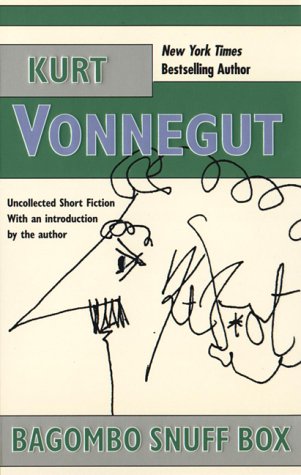I find short story collections tough to blog about. Actually, I find them kind of hard to read. You can really sink right into a good novel, but no matter how invested you get in a short story, it's over in ten or twenty pages. In this collection's introduction, Kurt Vonnegut shares a similar sentiment, comparing short stories to "fifteen-minute cat naps." This is the second Vonnegut short story collection I've read, and definitely the stronger of the two. The first one, While Mortals Sleep, was the second posthumously released collection of unpublished Vonnegut works. This means it was full not only of works that publishers had passed on when Vonnegut was young, but of the "next-best" thirteen or so such works.
I've said it before, but the difference in quality and style from Vonnegut's first novel to his second is bigger than the gap between his second and his fourteenth. Player Piano, from 1952, just wasn't that impressive; The Sirens of Titan, from 1959, is my second-favorite Vonnegut book behind only Slaughterhouse-Five. (Mother Night, his third book, from 1961, ranks third for me, and the classic Cat's Cradle - his fourth, 1963 - ranks fifth. So only a decade separates Vonnegut's clunkiest and most undercooked book from his golden era.)
What's interesting about Bagombo Snuff Box is that it presents a bunch of previously published Vonnegut stories from 1950 to 1962, provided here in chronological publication order. I know it's a cliche, but you really do see the man evolve stylistically as an author throughout this collection. That isn't to say that the beginning is all trash and the end is all treasure - the gems and duds are a little more intermingled than that - but there's a pleasantly perceivable shift in tone here all the same.
As far as the stories themselves go, there are plenty of standouts - so many, I guess, that "standout" isn't really an accurate term. Regardless, these were some of my favorites.
"Thanasphere" kicks things off with a wonderfully macabre sci-fi story. The first man goes to outer space only to be overwhelmed and driven insane by thousands of disembodied voices. This man's trip to the heavens has literally taken him to the realm of the dead. What's crazy to me is that this story came from 1950, and Yuri Gagarin didn't go to space until 1961, which means for a good eleven years or so this one was at least spiritually plausible for readers.
"Any Reasonable Offer" deals with a recurring Vonnegut theme - people pretending to be something they aren't. It's a tame story, like so many of his early efforts, but it's short and sweet and more than just a build-up to a punchline of sorts like some of the young author's lesser efforts from the time.
"Souvenir" involves a man remembering a dark episode from the end of World War II. It felt like a small Slaughterhouse-Five teaser of sorts.
"The Powder-Blue Dragon" featured a middle-class nobody blowing his life savings and then some on the sleekest, nicest, and sexiest car in the country, only to immediately despise it when it doesn't lead to affectionate attention from the fairer sex. A simple and enjoyable lampooning of masculine car culture.
"A Present For Big Saint Nick" was just patently absurd, even for Vonnegut. A mobster dressed up as Santa just keeps being an asshole to all these kids lined up to sit on his lap, and when he opens up a package rigged with small explosives that blow half his face off, the kids just erupt in cheers. Bizarre but darkly comic.
"Der Arme Dolmetscher" was a war-time story that dealt, again, with a man posing as something he wasn't. This one was teeming with military-related absurdisms, much like Catch-22, and it ended with a real stinger of a punchline.
"Find Me a Dream" was one of many quick little love stories in the collection, but this one had some real witty and bouncy dialogue. I attribute this to Vonnegut's evolving style and tonal command.
"Runaways" gently mocked the idea of young love and the mentality of every teenager who falls infatuated with the idea of being in love without having the slightest clue about what it means to actually love somebody. This one simultaneously made me laugh at kids and also miss being so young and naive. Timeless and endearing.
"2BR02B" is probably my favorite Vonnegut short story, and could be one of my favorite short stories of all time. In the future, aging has been cured. No one really dies of natural causes anymore. But this means population control is essential. Told with a perfect economy of characters (four) and settings (one), this ten-page tale will stay with you forever.
"Hal Irwin's Magic Lamp" started out seeming a little Gift of the Magi-esque, but made an abrupt dark turn toward the end and was all the better off for it. It is, essentially, the story of a proud man and his humble wife. It takes place in 1929.
I've rambled a lot at this point, and I still haven't even hit on a number of observations I wanted to make. Meh. So it goes!
I've got two more Vonnegut short story collections in the backlog, and there are a couple more in existence beyond that. We're not done with this guy at all on the blog. Not yet.

No comments:
Post a Comment